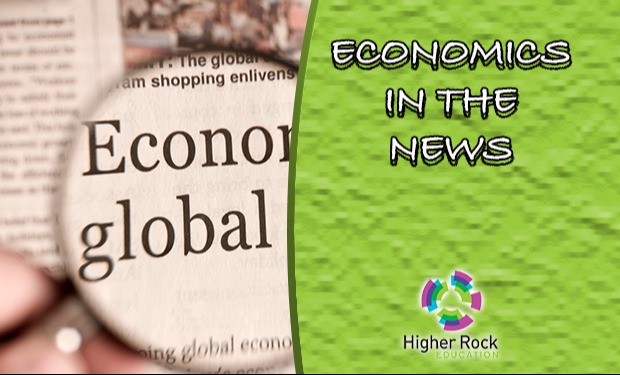
Economics in the News – Oct. 7-13, 2024
Economics impacts our lives every day. Below are some of the top storylines from this past week related to economics.
o The Nobel Prize for Economic Sciences was awarded to Daron Acemoglu and Simon Johnson of Massachusetts Institute of Technology, along with University of Chicago’s James Robinson. The trio received the award for their research into how institutions shape which countries become wealthy and prosperous.
The honorees looked at the history of the most prosperous countries, coming up with conclusions that countries that started out with more inclusive institutions during their colonial period tended to be more prosperous. Prosperity today is partly the legacy of how a nation’s institutions evolved over time. The laureates even found that different types of colonization brought about big shifts in fortunes. For instance, European nations used more authoritarian systems in places that were densely populated, where places that were sparser saw more settlers and a more inclusive form of government. In North America, the Aztec empire was populous and rich during its time, but today the United States and Canada are more economically prosperous than Mexico. [The New York Times]
o Total economic losses from Hurricane Helene and Hurricane Milton could soar over $200 billion, according to early estimates. Some consumer groups, lawmakers and analysts worry about the impact it will have to insurers’ finances, which could impact millions of people living in vulnerable areas.
In recent years, insurance companies have become increasingly reluctant to insure areas that are especially vulnerable to natural disasters and changes brought about by climate change. The ultimate fallout from two powerful hurricanes could accelerate that retreat. While it is too early to grasp the full impact of Hurricane Milton – which made landfall in Florida as a category three hurricane – early indications are comparable to 2022’s Hurricane Ian, which caused $55 billion of insured losses in the same area. The impact for customers will be another reason for insurance companies to raise premiums or further stop selling to people in those areas. [The New York Times]
o Local plumbing, as well as heating or air-conditioning companies are vital to their communities. Private-equity firms are taking notice, investing heavily in skilled trades, often buying small mom-and-pop shops to create a new class of millionaires. They are hoping to profit by running larger, more profitable operations. Critics of the private-equity firms believe that it could lead to higher prices for consumers and less competition, diminishing the quality of service.
Private-equity investors have purchased nearly 800 HVAC, plumbing and electrical companies since 2022. More capital helps companies tap into a larger customer base, adding service trucks and employees. In addition, it could provide opportunities to build apprenticeship programs and increase sales training for technicians. [The Wall Street Journal]
o Legal online sportsbooks provide bettors much more than just pre-game odds to bet. As the betting appetite has grown, it is imperative for the sportsbooks to offer in-game, live betting options. The odds change in real-time as on-field events occur, tempting bettors who are scrolling over the odds on their phone. What goes into changing the odds in-game?
Sportsbooks are relying on specialized companies that use data collection, statistics, algorithm-modeling and artificial intelligence to set the odds in real-time. With the vast amount of data at their fingertips, the companies are confident that they can set the proper odds for the most obscure prop bets – such as the odds for a last-second 60-yard field goal in the NFL. The specialized companies then sell the odds to bookmakers worldwide. [Bloomberg]
o The Social Security Administration announced a cost-of-living adjustment for Social Security and Supplemental Security Income benefits that begin in 2025. A 2.5 percent adjustment benefits 65 million Americans who receive Social Security and 7.5 million Americans who receive Supplemental Security Income.
While Social Security was never intended to be the primary source of income for retired Americans, it has become a major source of income for 58 percent of retirees. It surpassed retirement plans such as a workplace pension, a 401(k) plan and other retirement savings accounts. Research shows that as of 2021, Social Security was the only source of income for 28 percent of adult recipients. However, the government’s cost-of-living adjustment doesn’t take the rising cost of health care into account, which is one of the most significant expenses for retirees. [The Washington Post]